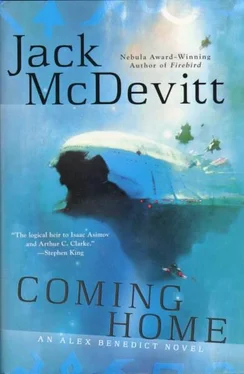“I met Garnett a long time ago. More than half a century. He was one of the finest people I’ve ever known. Totally honest. You could always count on him if you needed anything. I loved the guy. He saved my life once, and it killed me when we lost him.”
Alex’s eyes caught mine. We both wanted Southwick to get to the point, but the message for me was to be patient. Southwick continued for several minutes about Baylee’s virtues. The ultimate stand-up guy. Eventually, his drink arrived. He literally snatched it from the waiter, but he set it down on the table without trying it. “Nothing in his life mattered as much as the Golden Age. And the Apollo artifacts. They represented who we were. Not only the beginning of the space age, but he saw them as symbolic of the beginning of the human family. It was ultimately, he used to say, those early years, when science was on the march, and a world culture was developing as a result of the rise of global communications, that imposed a sense of empathy on us. That drew us together. Showed us who we were. During the early years of the scientific renaissance, people did not believe that the human race would ever come together. Science just provided bigger bombs. But Baylee always said it was the development of new forms of communication that gave everyone a voice and that, after a rocky start, provided us with the kind of world we have now.
“It wasn’t a straight line, of course. Sometimes things went badly. Dictators continued to show up. Civilization came close to collapse on several occasions and finally went under. They got through the Dark Age, only to have some of the colony worlds get into wars with each other. But Baylee maintained that once we were seriously able to talk to each other, a reasonable existence for everyone was inevitable. Which is why he so desperately wanted to find the Apollo artifacts. They marked, in his view, the launch point.” Finally, he picked up his drink, tossed it down his throat, and smiled. “I know you’re wondering why I’m going on like this. But you need to understand the man to understand what happened.”
Alex sat unmoving.
“He was hunting for them when I first met him. But people had been looking for them for thousands of years. The assumption was that they were simply gone. I don’t know how many times I told him it was all a waste. But then he came across the Marco Collins histories at Bantwell University. I don’t know whether you saw them. But there it was: He’d given the artifacts to Larissa.
“I guess there was a problem in translation there, but he recognized the name. He knew that Zorbas was originally from that area in Greece, of course. But he couldn’t believe there’d be any point in hiding the artifacts there. As far as we knew, it was just as unstable as the Dakotas. But a lot of people in that era, those who could, were establishing themselves on asteroids. Getting away from the civil conflicts. And he knew about the Larissa asteroid. Knew that one of Zorbas’s friends, Quincy Abbott, was supposed to have had a retreat there. It would have been the perfect place.”
“How did he find that out?”
“In Russell Brenkov’s It Never Happened . Brenkov was, I think, a late-Fourth-Millennium historian, somewhere in there, who specialized in discounting historical myths. Abbott led the fight in the Dakotas against the thieves and rebels during the Dark Age. He was believed to have returned from an asteroid home on Larissa when everything started to break down. Brenkov argued that the story was untrue, that Abbott had never lived on an asteroid. But it didn’t matter to Garnett, of course. What mattered was that the story established the existence of Larissa.”
I remembered the book from the Albertson Museum. In fact, I’d held it in my hands.
Southwick took a deep breath. “I’ll never forget the night he showed up at the dig site.”
“What dig site is that?” Alex asked.
“We were working in the London area. And suddenly he was there, out of nowhere, telling me he was pretty sure he knew where the Apollo cache was.”
“Wait a minute,” I said, “assuming he suspected everything was hidden on Larissa, how did he know which asteroid that was?”
“He spent almost twenty years tracking that down. He eventually came across a two-thousand-year-old fragment of Les Carmichael’s Last of the Giants , which was a substantive scientific history of the first two centuries of the Third Millennium. Unfortunately, most of it was illegible. But it included a list of the asteroids as they were originally known, matching them with their modern designators. Larissa was among them.” He finished his drink. Our glasses were all empty by then. Alex ordered another round, but I passed for the obvious reason that I would probably be on the bridge of the Belle-Marie before the night ended.
“ Last of the Giants ,” said Alex. “I never saw anything like that among his papers. Or in his library.”
“I’m not sure where he found it. Or what happened to it. But once he knew where it was, he came to me at the London site. I’ll never forget the way he looked that day. I’ve never seen anyone so happy and so excited. I suggested we get Heli to take us there.”
“Why Heli?”
“We could trust her to keep her mouth shut. We didn’t want to invite any scavengers.”
The music stopped. And started again.
Alex examined his glass. “Whose idea was it to sink the boat?”
Southwick made a noise deep in his throat. “Heli suggested it. But I was responsible for the decision.”
“We could have been killed.”
“Heli assured me they could work everything out. That they wouldn’t do it if there was any danger.”
That got a growl from me. “I wish you’d been there,” I said.
“I know. It was stupid. At the time, it seemed like a good idea. We hoped it would scare you off. I guess we should have known better. I think about it now, and I don’t know where my head was. Anyway, I apologize.”
“Did you have to buy them a new boat?”
“No.” He smiled. “Insurance covered it. They never really asked any questions.”
“Okay.” Alex glanced at me. Keep cool. “So the three of you went to Larissa.”
“Yes.”
“And did you find the artifacts?”
Southwick swallowed. Tried his drink again. “Yes.”
“And what happened?”
“The Zorbas family, or somebody, had built a house out there. A nice place, three stories, a mansion, really. They moved the smaller artifacts to the asteroid. They made no effort to take the shuttles or anything like that. Probably didn’t have that capability. But the small stuff tends to be what’s really valuable. Personal items, plaques, cups with mission names emblazoned on them, uniforms, helmets, journals. It was an ideal place because the vacuum inhibited decay. The objects would damned near last forever. It was a brilliant idea.
“We needed almost four days to get there. I think it was the longest four days of my life, Alex. But we did get there, and when we did—” He stopped, looking past me at whatever it was he’d seen that night. “Garnie was so excited he could barely contain himself.
“Then Heli told us there was a building. It was a dome, with a house inside. Somebody had lived on the asteroid. Maybe Abbott, maybe not. I don’t know whether I’ve ever seen anyone as ecstatic as Garnie was. He pounded his chair and shook my hand and tried to kiss the top of Heli’s head, but she told him to stay clear as long as the engines were running.
“I’d never seen him so ecstatic. And when I told him that it might be a good idea not to get too excited until we saw what we actually had, he laughed and said he knew it was still a long shot but how he was by God going to enjoy the moment anyhow. And if it really turned out just to be an old house in a strange place, then so be it.
Читать дальше












